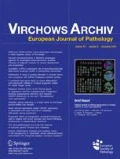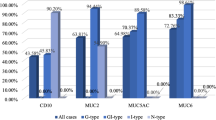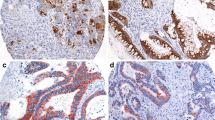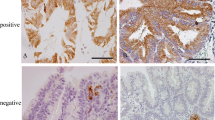Abstract
Duodenal carcinomas, such as ampullary tumors, may be a heterogeneous group of neoplasms that share differentiation features with gastric or colorectal carcinomas. Because of the cell- and tissue-specific expression patterns of mucins and trefoil peptides, these markers were used to investigate the differentiation status of duodenal and ampullary carcinomas in comparison with gastric and colorectal carcinomas. Adenocarcinomas (14 duodenal, 10 gastric, 11 ampullary and 10 colorectal) were examined immunohistochemically for the mucin gene products MUC1, MUC2, MUC5AC, MUC6 and the trefoil peptides TFF1 and TFF2. The tumors’ expression profile for MUC5AC, MUC6 and TFF1 was used to distinguish between gastric- and intestinal-directed differentiation. The mucins that were most often expressed in the individual tumor types were MUC1 (duodenal and ampullary carcinomas), MUC2 (colorectal carcinomas) and MUC5AC (gastric carcinomas). Further classification focusing on the expression profile for MUC5AC, MUC6 and TFF1 revealed that 21% of the duodenal and 45% of the ampullary carcinomas demonstrated mainly gastric differentiation (positivity for all three markers or only two of them). The remaining duodenal and ampullary carcinomas showed nongastric, i.e., intestinal differentiation (all three markers negative or only one marker positive). The gastric differentiation pattern characterized 60% of gastric carcinomas. Colorectal carcinomas showed intestinal differentiation in 100% of cases. Duodenal carcinomas have a heterogeneous mucin expression pattern that is mainly related to either gastric differentiation or intestinal differentiation. This also holds for ampullary carcinomas. Among the markers used, MUC5AC, MUC6 and TFF1 are most useful for revealing differentiation pathways in duodenal and ampullary carcinoma.





Similar content being viewed by others
References
Achille A, Scupoli MT, Magalini AR, Zamboni G, Romanelli MG, Orlandini S, Biasi MO, Lemoine NR, Accolla RS, Scarpa A (1996) APC gene mutations and allelic losses in sporadic ampullary tumours: evidence of genetic difference from tumours associated with familial adenomatous polyposis. Int J Cancer 68:305–312
Achille A, Biasi MO, Zamboni G, Bogina G, Iacono C, Talamini G, Capella G, Scarpa A (1997) Cancers of the papilla of vater: mutator phenotype is associated with good prognosis. Clin Cancer Res 3:1841–1847
Achille A, Baron A, Zamboni G, Orlandini S, Bogina G, Bassi C, Iacono C, Scarpa A (1998) Molecular pathogenesis of sporadic duodenal cancer. Br J Cancer 77:760–765
Adedeji OA, Trescoli-Serrano C, Garcia-Zarco M (1995) Primary duodenal carcinoma. Postgrad Med J 71:354–358
Albores-Saavedra J, Murakata L, Krueger JE, Henson DE (2000) Noninvasive and minimally invasive papillary carcinomas of the extrahepatic bile ducts. Cancer 89:508–515
Biemer-Hüttmann AE, Walsh MD, McGuckin MA, Simms LA, Young J, Leggett BA, Jass JR (2000) Mucin core protein expression in colorectal cancers with high levels of microsatellite instability indicates a novel pathway of morphogenesis. Clin Cancer Res 6:1909–1916
Buisine MP, Desreumaux P, Leteurtre E, Copin MC, Colombel JF, Porchet N, Aubert JP (2001) Mucin gene expression in intestinal epithelial cells in Crohn’s disease. Gut 49:544–551
Carvalho F, David L, Aubert JP, Lopez-Ferrer A, De Bolos C, Reis CA, Gartner F, Peioxoto A, Alves P, Sobrinho-Simoes M (1999) Mucins and mucin-associated carbohydrate antigens expression in gastric carcinoma cell lines. Virchows Arch 435:479–485
Gendler SJ, Spicer AP (1995) Epithelial mucin genes. Annu Rev Physiol 57:607–634
Gürbüz Y, Kahlke V, Klöppel G (2002) How do gastric carcinoma classification systems relate to mucin expression patterns? An immunohistochemical analysis in a series of advanced gastric carcinomas. Virchows Arch 440:505-511
Howe JR, Karnell LH, Menck HR, Scott-Conner C (1999) The American College of Surgeons Commission on Cancer and the American Cancer Society. Adenocarcinoma of the small bowel: review of the National Cancer Data Base, 1985–1995. Cancer 86:2693–2706
Jang KT, Chae SW, Sohn JH, Park HR, Shin HS (2002) Coexpression of MUC1 with p53 or MUC2 correlates with lymph node metastasis in colorectal carcinomas. J Korean Med Sci 17:29–33
Katoh M (2003) Trefoil factors and human gastric cancer (Review). Int J Mol Med 12:3–9
Kushima R, Manabe R, Hattori T, Borchard F (1999) Histogenesis of gastric foveolar metaplasia following duodenal ulcer: a definite reparative lineage of Brunner’s gland. Histopathology 35:38–43
Lee MJ, Lee HS, Kim WH, Choi Y, Yang M (2003) Expression of mucins and cytokeratins in primary carcinomas of the digestive system. Mod Pathol 16:403–410
Machado JC, Nogueira AM, Carneiro F, Reis CA, Sobrinho-Simoes M (2000) Gastric carcinoma exhibits distinct types of cell differentiation: an immunohistochemical study of trefoil peptides (TFF1 and TFF2) and mucins (MUC1, MUC2, MUC5AC, and MUC6). J Pathol 190:437–443
Manne U, Weiss HL, Grizzle WE (2000) Racial differences in the prognostic usefulness of MUC1 and MUC2 in colorectal adenocarcinomas. Clin Cancer Res 6:4017–4025
Moss WM, McCart PM, Juler G, Miller DR (1974) Primary adenocarcinoma of the duodenum. Arch Surg 108:805–807
Neugut AI, Jacobson JS, Suh S, Mukherjee R, Arber N (1998) The epidemiology of cancer of the small bowel. Cancer Epidemiol Biomarkers Prev 7:243–251
Nogueira AM, Machado JC, Carneiro F, Reis CA, Gott P, Sobrinho-Simoes M (1999) Patterns of expression of trefoil peptides and mucins in gastric polyps with and without malignant transformation. J Pathol 187:541–548
Nollet S, Forgue-Lafitte ME, Kirkham P, Bara J (2002) Mapping of two new epitopes on the apomucin encoded by MUC5AC gene: expression in normal GI tract and colon tumors. Int J Cancer 99:336–343
O’Riordan BG, Vilor M, Herrera L (1996) Small bowel tumors: an overview. Dig Dis 14:245–257
Pinto-De Sousa J, David L, Seixas M, Pimenta A (2001) Clinicopathologic profiles and prognosis of gastric carcinomas from the cardia, fundus/body and antrum. Dig Surg 18:102–110
Reis CA, David L, Carvalho F, Mandel U, De Bolos C, Mirgorodskaya E, Clausen H, Sobrinho-Simoes M (2000) Immunohistochemical study of the expression of MUC6 mucin and co-expression of other secreted mucins (MUC5AC and MUC2) in human gastric carcinomas. J Histochem Cytochem 48:377–388
Scarpa A, Di Pace C, Talamini G, Falconi M, Lemoine NR, Iacono C, Achille A, Baron A, Zamboni G (2000) Cancer of the ampulla of Vater: chromosome 17p allelic loss is associated with poor prognosis. Gut 46:842–848
Spira IA, Ghazi A, Wolff WI (1977) Primary adenocarcinoma of the duodenum. Cancer 39:1721–1726
Sylvester PA, Myerscough N, Warren BF, Carlstedt I, Corfield AP, Durdey P, Thomas MG (2001) Differential expression of the chromosome 11 mucin genes in colorectal cancer. J Pathol 195:327–335
Taylor KL, Mall AS, Barnard RA, Ho SB, Cruse JP (1998) Immunohistochemical detection of gastric mucin in normal and disease states. Oncol Res 10:465–473
Van De Bovenkamp JH, Korteland-Van Male AM, Warson C, Buller HA, Einerhand AW, Ectors NL, Dekker J (2003) Gastric-type mucin and TFF-peptide expression in Barrett’s oesophagus is disturbed during increased expression of MUC2. Histopathology 42:555–565
Wong WM, Poulsom R, Wright NA (1999) Trefoil peptides. Gut 44:890–895
Wright NA, Poulsom R, Stamp G, van Noorden S, Sarraf C, Elia G, Ahnen D, Jeffery R, Longcroft J, Pike C (1993) Trefoil peptide gene expression in gastrointestinal epithelial cells in inflammatory bowel disease. Gastroenterology 104:12–20
Acknowledgements
Yesim Gürbüz was a fellow of the Alexander von Humboldt-Stiftung, Bonn, Germany. The authors would like to thank Maike Pacena and Anja Paulus for their excellent technical assistance and Katherine Dege for editing the manuscript.
Author information
Authors and Affiliations
Corresponding author
Rights and permissions
About this article
Cite this article
Gürbüz, Y., Klöppel, G. Differentiation pathways in duodenal and ampullary carcinomas: a comparative study on mucin and trefoil peptide expression, including gastric and colon carcinomas. Virchows Arch 444, 536–541 (2004). https://doi.org/10.1007/s00428-004-1008-2
Received:
Accepted:
Published:
Issue Date:
DOI: https://doi.org/10.1007/s00428-004-1008-2




